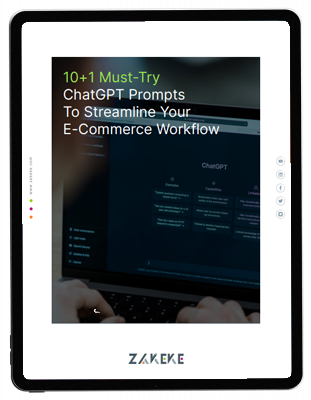Imagine yourself embarking on a virtual shopping spree. Do product descriptions leave you feeling as if you’ve touched and felt the item? Can you track your purchase as easily as following footprints on a beach? Is the website’s design your guiding star, or a confusing maze?
A seamless online experience can determine the success or failure of an e-commerce venture. Addressing challenges and implementing solutions can drive higher conversions and foster customer loyalty.
Let’s explore 5 pivotal strategies that stand between an ordinary e-commerce experience and a memorable online shopping journey.
#1. Tell the product’s story with detailed descriptions and genuine reviews
The importance of comprehensive product descriptions
Detailed product descriptions are a vital link between virtual shopping and the tactile experience of a brick-and-mortar store. Shoppers rely on these descriptions to gauge the utility and quality of an item. An accurate and vivid depiction can make the difference between a purchase and a passed opportunity.
A well-detailed product description plays a crucial role in lowering cart abandonment rates. When shoppers feel informed and confident about their choices, they’re less likely to second-guess their decisions. Thus, clarity in product information can translate to completed transactions and increased sales.
Integrate genuine user reviews
Peer reviews wield significant influence over online purchase decisions. Potential buyers often turn to these testimonials to gauge the real-world performance and reliability of products. Authentic user feedback serves as a trusted voice, guiding uncertain shoppers towards making a purchase.
Actively seeking and promoting user feedback is vital for e-commerce platforms. Authentic testimonials not only offer validation for potential buyers but also provide invaluable insights for businesses. An environment that welcomes and celebrates user experiences can foster trust and encourage future engagement.
#2. Use the latest tools to estimate accurate delivery dates
Why accurate delivery dates matter
Accurate delivery dates are crucial in meeting the heightened expectations of today’s online shoppers. Timely and precise delivery information can instill confidence and loyalty in customers – a promise kept builds trust, which is the currency of the online retail world.
Predictable delivery timelines play a key role in alleviating post-purchase anxiety. Customers who know when to expect their orders can plan accordingly, reducing uncertainty and dissatisfaction. Reliable delivery estimates can lead to a more relaxed and enjoyable shopping experience.
Technological solutions for accurate estimations
Real-time tracking is more than just a technological advancement – it’s an expectation. Offering customers the ability to monitor their packages in transit fosters a sense of control and transparency. It’s an element that enhances user satisfaction and cements the bond between brand and consumer.
Providing varied delivery options caters to the diverse needs of the online shopping community. Whether it’s express delivery for last-minute gifts or eco-friendly choices for the environmentally conscious, options empower customers. Catering to individual preferences can set an e-commerce platform apart in a crowded marketplace.
For businesses aiming to streamline deliveries, apps for optimizing delivery routes offer invaluable solutions to reduce transit times and improve overall efficiency. Finding the right app can transform logistics challenges into a systematized process, as evidenced by comprehensive user reviews and detailed pricing insights found in top-rated route planner apps.
#3. Make your online shopping journey quick and seamless
The significance of intuitive categorization
Intuitive categorization of products aids in smoother discovery and exploration. A well-organized site encourages users to delve deeper, exploring more products and broadening their shopping horizons. The ease with which a user can navigate can significantly influence their overall shopping satisfaction.
Efficient website navigation directly impacts bounce rates. Users who can quickly find what they’re looking for are more likely to stay and shop. Conversely, a clunky or confusing interface can drive potential customers away, taking their business elsewhere.
Robust search functions and filters
Robust search functions are indispensable for a seamless online shopping experience. When customers can swiftly locate desired items, it elevates their overall satisfaction and increases the likelihood of a purchase. A responsive search algorithm is therefore not a mere luxury, but a necessity.
#4. Offer recommendations that resonate with each shopper
Harness the power of machine learning
Machine learning, with its predictive analysis capabilities, is revolutionizing the online shopping experience. Analyzing user behavior and preferences allows e-commerce platforms to present tailored product suggestions. Such personal touches enhance user experience, leading to prolonged engagement and increased sales.
While personalization can enhance the user experience, there’s a fine line between being helpful and intrusive. E-commerce platforms must prioritize privacy and discretion, presenting suggestions without overwhelming or alienating the user. A delicate balance, when struck, can create a harmonious shopping environment.
Benefits to both businesses and shoppers
Personalized shopping suggestions have a direct impact on average order values. When shoppers encounter relevant product recommendations, they’re more likely to add additional items to their carts. Tailored suggestions can thus lead to greater sales and a boosted bottom line.
Beyond immediate sales, personalized suggestions foster longer-term customer retention and engagement. Shoppers who feel understood and catered to are more likely to return and become loyal patrons. Cultivating such a relationship requires a blend of smart technology and genuine customer-centricity.
#5. Ensure returns and exchanges are hassle-free
Build trust through transparency
Clear communication is at the heart of effective return and exchange policies. Shoppers should easily understand the process and terms, leaving no room for ambiguity. Straightforward and transparent policies can instill confidence, encouraging more individuals to shop with peace of mind.
Easy eCommerce returns are a potent driver of repeat business. Shoppers who know they can effortlessly return unsatisfactory items are more likely to make purchases in the first place. This trust can lead to increased loyalty and subsequent sales, benefiting both parties.
Best practices for a seamless return/exchange process
Prepaid return labels simplify the return process for customers. Such a gesture demonstrates a brand’s commitment to customer satisfaction and reduces the hassle associated with returns. Alleviating potential return-related stressors can bolster business reputation and customer goodwill.
The digital age demands digital solutions, especially in return and exchange processes. A streamlined, online system for processing return requests enhances efficiency and user satisfaction. An intuitive digital returns process can turn a potentially negative experience into a positive one, encouraging future business.
The Last Stop: What’s Next for the Online Shopping Experience?
Each strategy, from detailed product descriptions to hassle-free return policies, plays a distinct role in refining the online shopping journey. These measures, when implemented thoughtfully, can transform the virtual storefront into an inviting, efficient, and reliable space.
An optimized user experience offers e-commerce platforms a significant competitive edge. In an era where options abound, platforms that prioritize user-centric strategies can distinguish themselves and secure a loyal customer base. Adopting these best practices isn’t just good for business; it’s essential for the future of online retail.
How is your business adapting to meet the heightened expectations of today’s discerning online shoppers? What distinguishes your online shopping journey from the rest?

Alex Selwitz
Director of Digital Marketing – Red Stag Fulfillment
Alex Selwitz is the Director of SEO for Red Stag Fulfillment, an eCommerce fulfilment warehouse that was born out of eCommerce. He has years of experience in eCommerce and digital marketing. In his free time, Alex enjoys playing guitar and learning about new trends in the digital world.















